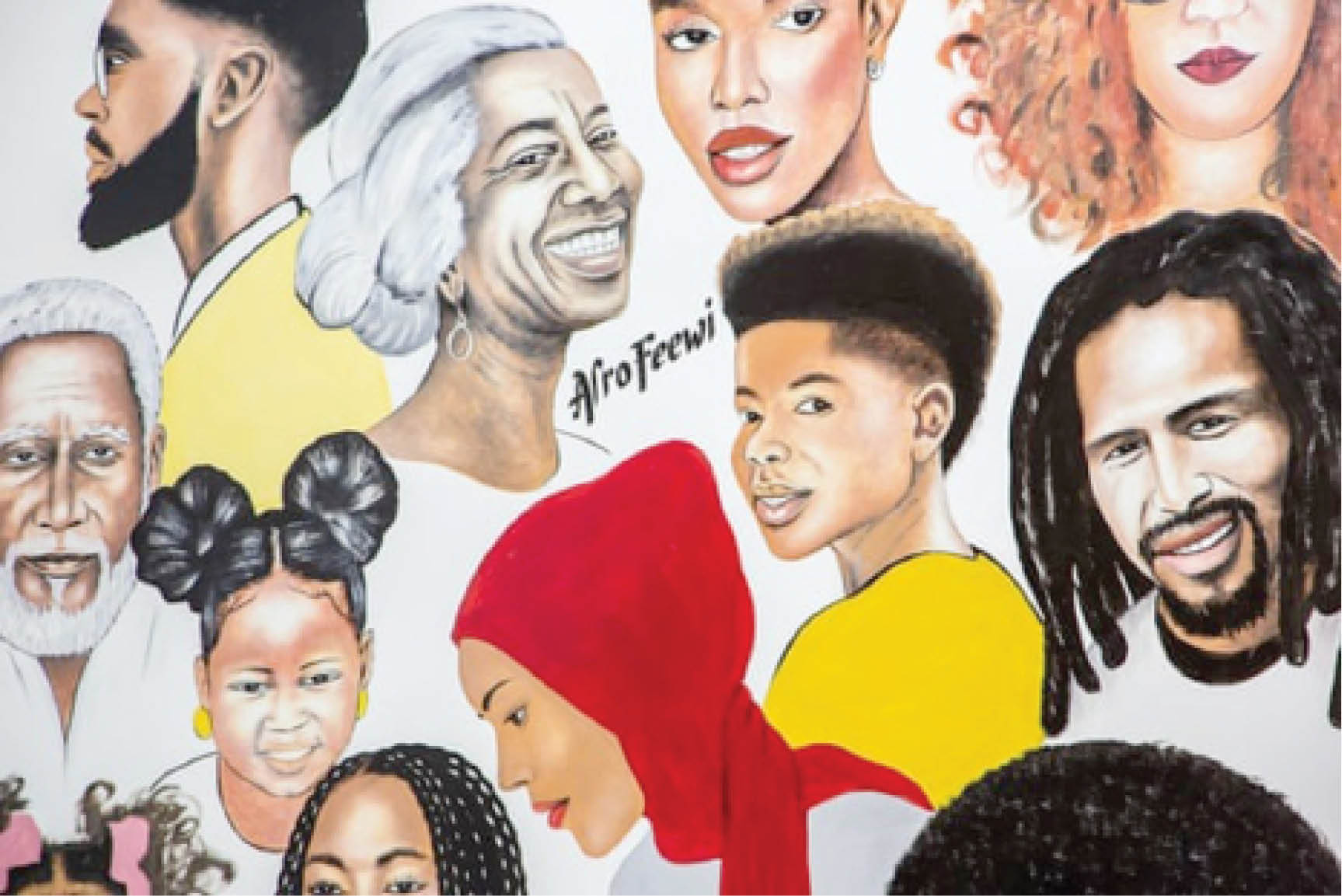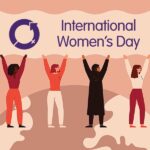From Senegal to Nigeria, a growing wave of salons and small cosmetic companies are challenging colonial notions about how to wear and care for hair.
Women kick the sand from their slippers and ease into the cool comfort of a natural hair and skincare store in central Dakar. On the shelves are jars filled with handmade supplements of organic shea butter, coconut, castor and olive oils, sourced from across west Africa.
In floral silk hijabs and abaya dresses, the women sit on sofas near the back of the store, discussing their hair beneath a mural of poised black women and men, wearing a mixture of classic natural black hairstyles.
Khadidiatou Ba’s Afro Feewi store, a “safe space” hosting community groups and free hair consultations, is the culmination of a journey that began during her childhood. Painful struggles with her hair texture and self-image as a dark-skinned black woman in Senegal led Ba, popularly called Jatouna, to start a blog on black haircare and begin experimenting with products that catered for her needs.
“I grew up in a family that thought you needed to have straight hair to be beautiful, that’s how they used to think,” says Jatouna, now 22. “But I learned to accept my hair and then to love it. I learned to take care of it.
“It’s hard here because people are still assimilated to many things related to colonisation,” she says. “In Dakar, a lot of people still think that beauty standards are straight hair, light skin. Though it’s changing, it’s still a real challenge.”

In her salon, groups of mainly young women discuss and share natural haircare, not to disparage synthetic or human hair extensions, Jatouna says, but to explore the expanding hair choices for black women, challenge misconceptions that wearing natural hair is not beautiful, and to advise on treatments and haircare regimes.
“When it comes to hair, you can have natural hair and do protective styles [such as wigs or woven extensions], and people will think that you don’t like natural hair, which is not the case,” she says. “You can wear a lot of wigs, have your natural hair and take care of it. It’s just a choice. The essential part is to use good products.
“We really work on self-esteem, self-love and self-acceptance, which is the hardest part. We’re sellers, psychologists, friends,” she says, of her store and social media posts about treatments and products for different categories of black hair. “A lot of the content tries to teach and share what we know about hair, what we know about the dangers of relaxing the hair.”
In Senegal, women and men have to contend with a colonial legacy of beauty standards and an idealisation of Eurocentric and lighter-skinned features. Techniques such as relaxing – a common process of chemically straightening hair – is prevalent, often causing hair breakage and scalp damage. Notions that black hair is not desirable, and should be changed or covered are widespread. Skin bleaching is also prevalent, as in much of West Africa, amplified by ubiquitous advertising from major skin brands, and cultural imagery that depicts lighter skin tones as more beautiful.
“My mother used to straighten my hair with relaxers and it never worked,” Jatouna says. “I would have a friend with the same relaxer as me, she would have straight hair, you know very straight, flying in the wind, and I would have my kinky hair – ‘messy’ as people would say – and it was so painful. In hair salons in Dakar, hairdressers would tell me they needed to put more relaxers. I just couldn’t do it anymore.”
In recent years, there has been a surge of women-led organic hair and skincare businesses in black-majority countries and diasporas, built on their experiences navigating ideas of their own beauty. Many, like Jatouna, have grown their following via social media, where they promote a sense of self-worth for women. In Senegal, it is younger women who have led a wave of successful small to medium beauty businesses, which includes Boudoir Ophelia, Mossane Beauty Concept and Nubian Cosmetics.
There has also been a rapid growth in homemade hair and skincare products, using ingredients such as shea butter, and castor and coconut oil, long available in Africa. The products have steadily become more commercialised, especially during lockdowns when young women have had more time on their hands to make products at home. Newer innovations, such as mixing shea butter with natural scents such as almond, have also driven their popularity.
After relaxing damaged her hair and left her scalp sore, Jatouna spent months researching blogs and videos by black women on how to treat different types of hair, and the best natural remedies to use.
“It’s both the products we should use, and how to use them,” she says. Much of what she makes includes ingredients sourced from Senegal and neighbouring west African countries, through predominantly female market sellers and traders.
In the nearby Grand Yoff market, Marianne – known as Madame Marianne by her customers – scrapes chunks from a large mound of shea butter, on a stall she has had for 20 years. “I get it from Burkina Faso. They produce plenty of it there,” she says. “It’s not always been so popular. Now you see more younger people buying it. Younger women, especially.”
Shea butter works well for people’s skin and hair, she says. “It’s not a new thing. I have used it, mixing it with olive oil – it’s good for the skin. Some people like it but complain of the smell, so mix it at home with different liquids to give it a better smell.”
Despite the growth in popularity of shea butter, the proceeds for traders have improved only marginally, Marianne says, while at the other end of the chain, products sourced from African countries are growing in market share.
Ade Balogun was an architect, also working in e-commerce, in Lagos when her career took an unexpected turn. “I cut my hair and started locking it. I didn’t think anything of it, it was really a decision made to free up time. It wasn’t political, it was convenient,” she says.
She quickly realised that misconceptions of locks were widespread in Nigeria. “They assume you’re into marijuana, they associate [them] with some form of rebellion,” she says.
“My peers were wearing fancy weaves with bounce, and to them, my hair looked boring. So I started to research different things I could do to my locked hair and blog about it. I realised there are so many ways you can wear and style locks, curling it and so on.”
She opened Locitude, one of the few stores dedicated to natural styles of locking and treating hair in Ikoyi, an affluent area of Lagos. Six co-workers surprise customers with a range of styles, locking the hair in bantu style, complex plaits and wraps. A growing selection of online videos and blogs teach about locked natural hair and how to care for it.
Balogun began producing organic beauty products made with essential oils such as rosemary, hibiscus and coconut, mostly produced in local women-owned factories and by traders in Lagos and Badagry. “I use the palm rolling method, which is a completely natural method. It shocks people because they don’t always realise how easy it is for our hair to lock.
“Not all chemical methods are bad, but sometimes you have methods where people have locked their hair through a combination of soaking it in coffee and toothpaste,” she says. Other commonly used products, like wax, can also weigh hair down, and damage and break it.
Balogun says she works hard to break down negative stereotypes associated with locked hair. “My consultations are free because there are a lot of misconceptions about our own hair that we’ve grown up with.
“Hair is so complex and rich. You can look at someone’s hair and see whether they’re drinking enough water if they’ve been using harmful products.
“One of the things I enjoy most about my work is helping people understand that some of the ways they’ve approached their hair have been completely wrong.”
Culled from https://www.theguardian.com/

 Join Daily Trust WhatsApp Community For Quick Access To News and Happenings Around You.
Join Daily Trust WhatsApp Community For Quick Access To News and Happenings Around You.


